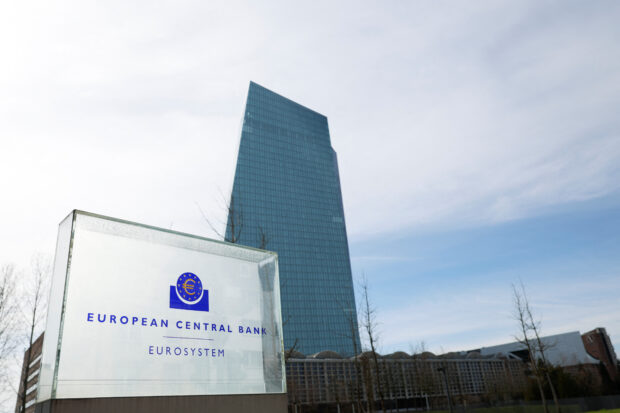ECB has tough job to fight rate cut bets as inflation falls

A view shows the logo of the European Central Bank (ECB) outside its headquarters in Frankfurt, Germany March 16, 2023. REUTERS/Heiko Becker/File photo
FRANKFURT – The European Central Bank faces a difficult balancing act on Thursday as it likely slashes its forecasts for growth and inflation while trying to temper speculation about imminent interest rate cuts.
The ECB is certain to leave borrowing costs at record highs, with the only possible policy change relating to the end of its last surviving bond-buying scheme – a legacy of the COVID-19 pandemic.
But the central bank’s last meeting of the year will be anything but dull, with President Christine Lagarde under pressure to defend or ditch her guidance that rates will stay where they are for the next couple of quarters.
READ: ECB keeps rates on hold, rejects talk of future cuts
Investor expectations now point to a first rate cut in the spring, which may make the ECB the first major central bank to reverse course after a global, concerted effort to bring down inflation since mid-2022.
Lagarde is likely to push back against rate-cut bets after it took the ECB a year and a half, and 10 straight hikes, to steer inflation onto a convincing downward path.
“We expect the ECB to acknowledge that inflation has declined more rapidly than expected but to be coy about declaring victory prematurely,” Deutsche Bank economists said.
The Federal Reserve also signaled late on Wednesday that lower borrowing costs are coming next year, which may make any ECB pushback even harder.
Lagarde will find little support in the ECB’s updated economic projections which are expected to downgrade both inflation and GDP forecasts, particularly for next year, bringing them closer to consensus estimates.
Economists polled by Reuters see prices in the euro zone growing by 2.5 percent in 2024, 2.1 percent in 2025 and 2 percent in 2026 – closing in on the ECB’s target after an outsized 5.5 percent increase this year.
The trouble for Lagarde and her Governing Council colleagues is that the ECB’s projections have often been wide of the mark – most significantly in 2021, when the central bank failed to anticipate the surge in inflation.
READ: Euro zone inflation tumbles, pitting ECB against markets
“Given the track record of the last few years, the central bank simply can’t afford to anticipate what might happen, it will have to wait until it happens,” ING economist Carsten Brzeski said.
Influential ECB board member Isabel Schnabel set the tone last week, when she took further interest rate hikes off the table given a “remarkable” fall in inflation.
Lagarde is expected to echo her argument that policymakers should not guide for rates to remain steady through mid-2024, but instead focus on economic data.
“We expect a clear shift of tone to emerge, with data dependency of any upcoming decision even more stressed than in the past,” Natixis economist Dirk Schumacher said.
Money-market traders are betting on a possible reduction in borrowing costs as early as March and a slim majority of economists polled by Reuters think it will come by June.
The Fed was also expected to cut in March or May at the latest.
Bond rally
Those expectations have been brought forward since November’s weaker-than-expected inflation data and Schnabel’s comments to Reuters.
The ensuing bond rally has eased financing conditions, the opposite effect to the one the ECB has been trying to achieve via higher rates.
But there is a silver lining. It should now be easier for the ECB to decide on the future of its Pandemic Emergency Purchase Program.
This was due to run until the end of next year but several policymakers have called for an earlier exit given bond markets show no sign of pandemic-era stresses.
The ECB is likely to discuss whether to stop replacing bonds that mature although it could defer a decision until early next year.
Anatoli Annenkov, an economist at Societe Generale, said the ECB may cap reinvestment at 10 billion euros ($10.8 billion) from March or April – down from 15-20 billion euros – with a view to ending purchases altogether by mid-year.
($1 = 0.9268 euros)